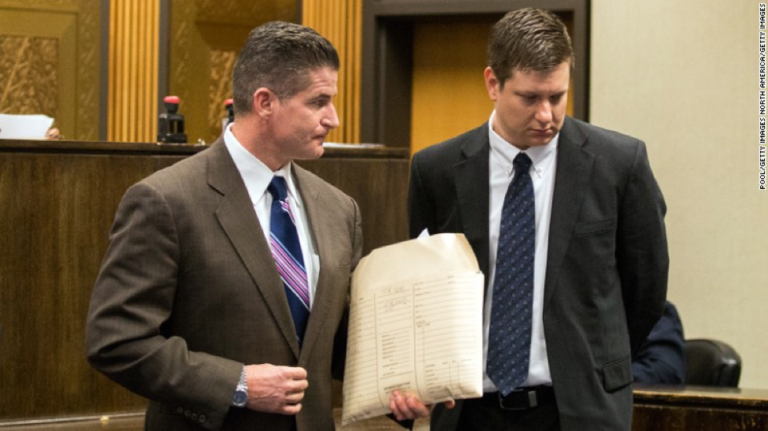By David Thomas
Law Bulletin staff writer
Lawyer Daniel Q. Herbert said he has no trouble placing himself in the shoes of his client Jason Van Dyke — the Chicago police officer facing first-degree murder charges for the shooting death of Laquan McDonald.
That’s because Herbert, a former cop himself, understands the split-second decisions officers must make while on patrol.
The October 2014 incident has created a political firestorm around city hall since Cook County Associate Judge Franklin U. Valderrama ordered the public release of dashcam video showing Van Dyke shooting McDonald, a black 17-year-old, 16 times.
Cook County State’s Attorney Anita M. Alvarez filed murder charges on Nov. 24, hours before the city released the footage.
McDonald was carrying a three-inch knife in his hand when officers approached him by car. Initial police accounts said the teen moved toward the officers with the knife, but the charging documents indicate Van Dyke and McDonald were about 10 feet apart when shots rang out.
Van Dyke pleaded not guilty to six counts of first-degree murder and one count of official misconduct in a December hearing before Cook County Circuit Judge Vincent M. Gaughan.
A spokeswoman from the state’s attorney office declined to comment on Van Dyke’s case.
Herbert indicated he plans to draw on his professional experience in his defense of Van Dyke.
“I think my situation allows me to have a better understanding of the mindset of a police officer in general,” he said.
Herbert served as a Chicago police officer from 1992 until 2001, when he took a leave of absence to serve as a Cook County assistant state’s attorney.
During four years as a prosecutor, Herbert served in the Felony Narcotics Unit and Felony Trial Division. In 2005, he formally retired from the police force and left the prosecutor’s office to become the in-house attorney for the Chicago chapter of the Fraternal Order of Police.
And in 2010, Herbert left the FOP role to open his own practice, Daniel Q. Herbert & Associates.
In an interview with the Daily Law Bulletin, Herbert wouldn’t offer details on potential evidence or his client’s legal strategy for the eventual criminal trial.
But he indicated he will argue Van Dyke’s actions that night in 2014 were reasonable.
“When I believe that a police officer made a split-second decision based upon being fearful and based upon their perceptions, I have no problem defending a police officer in those situations,” he added.
He said police officers today are “on edge” as a result of the violence in the city, comparing their experiences to soldiers in a war zone. And like soldiers, he said, some officers might be suffering from post-traumatic stress disorder.
Herbert also exnewsed frustration that so much public commentary on the shooting has alleged racial undertones to the officer’s decision making.
“In the vast majority of deadly force situations … [police officers] likely have no idea what race the individual is,” Herbert said. “When they arrive on the scene, they are focused so intently on that weapon, that their field of vision is narrowed to approximately to one or three degrees, which basically precludes these individuals from recognizing what race somebody actually is.”
And he stressed that police dashcam videos can’t provide full context of an incident outside the gaze of the car-mounted lenses.
“Video, no matter how clear it is, does not ever tell the full story, unless it is a video that captures every single event that is relevant from the relevant perspectives,” Herbert said.
“It’s always two-dimensional in nature … it really does distort distances to a significant level in some areas,” he added.
Herbert said he understands the serious and delicate nature of officers using deadly force because he had to use it during a police stop in 1995.
An armed home-invasion suspect had attempted to escape from the scene in his car, Herbert said. When the suspect got out of the car and leveled his weapon at Herbert and the other officers, Herbert said, he and his colleagues fired. The suspect dropped instantly but was not killed and eventually went on trial. Herbert received a distinguished service award for his role in the incident.
Police work runs deep in his family. Herbert’s father Mike was a Chicago police officer for 36 years; Herbert was actually named his father’s first partner, Daniel Quinnan, who was shot and killed on duty in 1966.
Herbert said a “solid base” of his clients are police officers and other government workers. He bills between $250-$350 hour, but he said this can fluctuate depending on the client and the work involved.
As a former officer, he said he understands the limited salary his clients can sometimes have. Sometimes the police union will pay part of the tab, but Herbert said he works with officers who have thin budgets.
Prior to this case, Herbert said he has never represented Van Dyke before — though he added he has probably represented someone in Van Dyke’s unit.
“I believe in him,” Herbert said, when asked why he agreed to represent him. “And I believe that, not only is he entitled to a defense but hardworking men and women of the police department who perform actions in a split-second in a deadly war zone … I believe that police officers are entitled to a good defense.”
Herbert said he is not a “hapless defender” of police officers. He indicated that when he first joined the department, he realized not everyone was a good officer.
And having represented many officers throughout his legal career, he acknowledged he liked some more than others.
When asked if he thinks Van Dyke did anything wrong, Herbert replied: “At the end of the day … my position on that is quite frankly irrelevant.”
“Based upon what I know of the case, I felt comfortable representing Jason Van Dyke,” he said.
The case is People v. Jason Van Dyke, 15 CR 20622.


